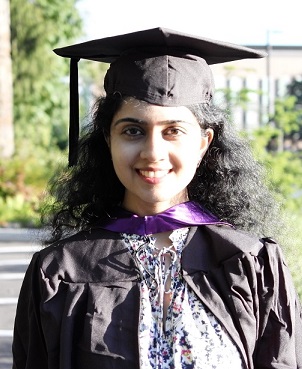A Career Pivot

Manisha Ramaseshan
Regulatory Affairs Associate, Chinook Therapeutics
When Manisha Ramaseshan began her educational journey, she intended to pursue a career in the life sciences. With a bachelor’s degree in biotechnology and a master’s degree in genetic engineering, Manisha’s goal was to do research in immunogenetics.
But she had a change of heart after her research internship and decided she wanted to work outside of a laboratory environment.
“I was looking at career options where I could still stay within the life sciences because it’s a space I'm so deeply passionate about,” Manisha said. “I felt like biomedical regulatory affairs was a great fit for me to pivot to. And that’s when I came across the UW Master of Science in Biomedical Regulatory Affairs program.”
In this interview, the 2021 grad talks about her experience in the program and how it helped her refocus her career pathway.
Tell us about your current job.
I’m a regulatory affairs associate at Chinook Therapeutics, which is a biopharmaceutical company that develops therapies for kidney diseases. I interact with a lot of different teams, like clinical development, toxicology and medical writing. I also interact with subject matter experts to get more knowledge about the product I’m working on.
I like that I’m always learning something. In the regulatory affairs field, there are always new updates to regulations. I frequently use the Food and Drug Administration website to read up on industry updates and new guidelines. There’s a rich history on why these were put in place. Every morning when I log in, I know that something new is happening and that there’s something new for me to learn. I think that’s a very exciting part of my job.
How did earning your master’s degree help you step into this role?
The program covers the technical aspects of what's involved in regulatory affairs, and it gives you some practical skills, like how to navigate the FDA website. I also worked on different projects throughout the program that provided insight into the field.
For example, we had protocol writing projects that we did as a team. Those projects helped me learn how protocols are written, as well as the critical thinking, communication and teamwork skills you may need as a regulatory affairs professional.
Those skills are really important because when you’re working for a company, it’s not just about doing your job. You need to work with people with diverse ways of thinking and collaborate as a team.
Why did you choose the BRAMS program at the UW versus another institution?
There were three factors that influenced my decision. I was living in the Pacific Northwest and knew about UW’s commitment to excellence, so I felt like the UW would be a great place to study.
The program’s curriculum and focus on regulatory affairs as well as clinical research also appealed to me. You can choose the path you want to go down.
And third, the practicum, which gives you hands-on experience working on a product. You’re assigned a mentor — the program calls them a preceptor — and you’re able to learn actionable insights and skills that prepare you for a real-world scenario.
Tell us about your practicum experience.
It was such a great learning experience. I worked with Washington Research Foundation on a clinical decision support software. The product was still in the early stages of development, and we were trying to determine if this product would eventually come under the bounds of the FDA's oversight. We had several guidance documents that talked about how and when a clinical decision support software could be regulated as a medical device by the FDA.
My preceptor and practicum coordinator offered guidance on what aspects to look at. They gave me the right amount of freedom to do my own research, but at the same time, if I found myself in a pickle, they were more than happy to guide me through that.
What kind of connections did the program help you make?
We had numerous guest lecturers and speakers, and they brought a lot of additional information and wisdom to the table. There’s so much you can learn from someone within the industry. I would encourage students to always pay attention to the guest speakers because their insight is very valuable. You don't get that by just doing the program. You get that by meeting people who have worked on products in the real world.
My peers were also amazing. Because of COVID, we were mostly a virtual classroom. But we were still able to learn so much from each other. We came from different professions and educational backgrounds. These diverse perspectives were invaluable in thinking about how to solve problems. The questions my classmates asked were very insightful, and I absorbed so much information from them.
What would you say to someone who is thinking about applying to this program?
I would definitely recommend this program to anyone who's thinking about applying. The program gives you a lot of networking opportunities, plus you have access to all of UW’s resources, like the Career and Internship Center. I really benefited from working with their counselors. They had some great suggestions for improving my resume and LinkedIn profile. By the time I graduated, I had two job offers, so the program really helped break me into the industry.